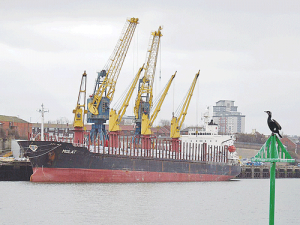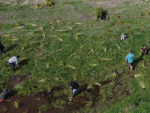A ship barred from discharging its palm kernel expeller (PKE) cargo remained anchored off Tauranga Port late last week.
The Ministry of Primary Industries, which ruled that the MV Molat couldn’t discharge the 23,000 tonnes of PKE it was carrying, refused to say whether the importer, understood to be ADM, had appealed against its decision.
Responding to questions from Dairy News, MPI said it has placed an order on the vessel not allowing it to discharge the PKE.
“Its current location off the coast of Tauranga poses no biosecurity risk and as such MPI has placed no other orders on the vessel,” it said.
Asked if the importer had appealed against MPI’s decision, MPI said “that’s not for us to comment on”.
Federated Farmers biosecurity spokesman Guy Wigley says he doesn’t know why the ship was still there last week.
“That’s something MPI may be able to explain but its cargo isn’t wanted here so it should leave,” he said.
The MV Molat arrived on September 6 from Port Klang, Malaysia, according to marinetraffic.com which carries live information on ship movements.
MPI initially prevented the MV Molat unloading after finding some of its cargo had come from an unregistered PKE facility in Malaysia.
Two weeks ago MPI ruled that was sticking to its earlier decision; this followed an application from the importer to have the PKE treated in New Zealand.
American company ADM is a small player in the NZ feed market, although offshore it owns a major share of the commodity trader Wilmar which supplies PKE to Fonterra-owned Farm Source.
A contact in the feed importing industry says MPI’s decision to reject the cargo to preserve the integrity of NZ’s import standards is a “good result”. The contact says ADM probably expected it could bluff its way past MPI using lawyers and get the cargo cleared for discharge at Tauranga.
MPI’s decision to refuse entry for the cargo now means ADM will have to take it to a country with import standards less stringent than ours and sell it, probably at a heavy discount because it is “distressed cargo”.
The shipment has been on the water for over six weeks, so costs so far could run close to $1 million. By the time it has reached another port and found a buyer ADM could have incurred another $1m in costs plus whatever discount they have to sell the PKE at.
While the 23,000 tonnes will not make much difference to the volume of supply of PKE in NZ, ADM NZ’s own stocks are now heavily reduced as a result of MPI’s decision to reject the shipment and it may now struggle to meet its own customers’ demands in the short term.
MPI says it spent a lot of time looking for a solution that would meet biosecurity requirements, but nothing ticks all the boxes in mitigating the risk of pests and diseases entering NZ.
Steve Gilbert, MPI border clearance services director, says that in making the decision MPI considered the amount of product involved, the availability of heat treatment facilities in the region, transport and storage.
Update: According to vesselfinder.com the ship may be on its way to the Panama Canal.


















